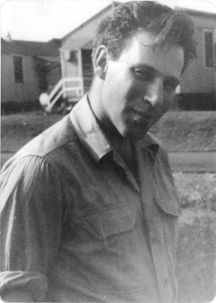Photo submitted by Richard Hell of ‘The Runaway’s Father’ in a November 2000 issue of Ace.
Special thanks to Mick Jeffries for inviting Ace to be on the radio on Trivial Thursdays on WRFL this morning.
The Ace Pick for radio-related Trivia of the Day was the essay (Lexington native) Richard Hell contributed to Ace in November 2000 (at the request of his friend Chris Offutt, who helped coordinate), about running away, for the first time. That issue was largely written by some of our most celebrated “Lexpatriates,” with Hell being one of the more infamous among them. We played “Blank Generation” in celebration.
This past Monday, Hell emceed the “5 Under 35” reception for the National Book Awards in New York. One of the honorees was C.E. Morgan, who—according to the National Book Award site— is living in Berea and “studied English and voice at Berea College and received a Master of Theological Studies (M.T.S.) from Harvard Divinity School. Her short story ‘Over by Christmas’ was published on the op-ed page of The New York Times this past Christmas. All the Living is her first novel. She’s currently working on a novel about horse racing and race relations.” http://www.nationalbook.org/5under35_2009.html
Because the old online Ace archives have not completed the move to the new site, what follows is the cut-and-paste of Hell’s essay that ran in the November 9, 2000 issue:
————————
What My Father Did The Second Time I Ran Away
a few months before he died [runaway notes]
by Richard Hell
————————————————————————————————————————
When I was a kid I ran away from home over and over. I wasn’t very good at it – I didn’t succeed until I was 17 – but it was my favorite thing to do. It just feels so good to take off for unknown parts. I’ve thought I’d like to try to write down those runnings away I remember to see what they look like in a row. This one is also my strongest memory of my dad. He died of a heart attack at 38 (very heavy smoker, for one).
I remember two things about Pat Thompson, my first best friend. One includes the other buddy we ran away with. At recess in the schoolyard Pat put his arms around
our shoulders for a conference and then banged our heads together and laughed. I was shocked he did that. The other is that when Pat moved away that year we exchanged mementos of each other and what I took was the heel of his shoe. I can still see it in my mind. It’s dry and concave, and bent little skinny nails are poking up from it and his signature is on it in felt-tipped pen. I kept it for years. It’s as good a thing to keep as the next. (In fact now I think of the signed first editions I collect. [I’d like to write a book like that shoe heel.])
This was 1958, and I was eight. Lexington, Kentucky. The half-built suburb to which we’d moved the year before was still making do with a tiny old faraway farmhouse converted to a schoolhouse for the small children of the young couples who were filling the new houses bumping up towards it. It was musty and brown at the top of an overgrown hill and held three classrooms – one for each of the first three grades. A shallow, wide-mouthed cave opened into the side of the hill and the three of us were to meet there at midnight.
All afternoon after school that day I tried to seem natural as I gathered secret supplies from around the house. I was sneaking crackers and peanut butter and tools, etc., from out of cupboards and drawers and the ice box (people still used that word though it was an electric refrigerator) and carrying them back to the bedroom which I shared with my younger sister. That night I was going to wrap it all in a cloth which I’d tie to the end of a stick to carry over my shoulder.
Always the damned parents have to become this thing you define yourself against (and they are made to suffer for it). They’re either monsters of fake perfection or the most damaging freaks and impositions. Almost as bad is when they are just embarrassing. When finally all of it’s just so much this and that, so much clouds blowing across the sky, so much water under the bridge. Who are you going to be if you’re not yourself? I would always just want to leave them behind with all their assumptions about me (and everything else). I used to have a theory about families and the way you’re supposed to love and be loyal to your own, no matter how much you might really think they’re crazy or fools or just strangers. I figured that actually you’re supposed to do that because they’re idiots and strangers and the social standard of the importance of being good to them allows the world a quick check of your decency and compassion level. Society understands that if you can be nice to your family, you can be nice to anyone, and it’s probably true.
But I had no problems with my family when I was in the third grade. I just wanted to run away to parts unknown, where I could be an unknown too.
I remember the extreme fun of the surreptitious gathering of the things I would carry. To already be that free. (Alive in the breaking of one law/rule, and they all become more fragile: it’s true, like marijuana leading to heroin!) It was thrilling and nerve wracking, my ears super-sensitized to any snap or rustle of motion from the furthest reaches of our little house, as I slunk around furtively, taking. Eventually it was close to bed time. My sister and I had to be brushing our teeth and getting into our pajamas. (What the hell kind of word is “pajama”? It’s Hindi.) I couldn’t find my damn pajamas. They belonged in the bureau drawer, but I couldn’t find them anywhere. Then the whole household was helping me look, and just as I realized what’d happened my father calls out and he’s found them along with the rest of my stash of provisions where I’d hidden it all beneath my pillow. I was busted.
It’s bedtime but all the lights stay on. My pretty little sister is awed. My heart’s in my throat and the critical drama splits and flowers open to view across, my throat stricken, fumbling, and then I’m deeply resigned as it unfolds out…
And now here is the strange part: his reaction. My father told me that at midnight he would drive me himself to the cave and that if my friends were there I could go with them. I was amazed then (he’s great) and I still am now (but what is going on?).
I don’t remember how we got to midnight. It seems to me the lights stayed lit. Just before 12:00 we got in the mildewy front of the big old Kaiser car and he drove me the five minutes to the distant rendezvous site. He was friendly and concerned. My confidence was a little reduced by his careful kindness, but I imagined the triumph of being left with my friends to figure our next move. They’d think what a great dad I had. We waited in the car with the lights turned off, and nothing happened and nothing happened; no one came. We waited until I couldn’t complain that we’d left too soon and then we drove home.
I don’t remember anything else about what happened and the only one who remembers it at all is me.
Richard Hell, who was born and raised in Lexington as Richard Meyers, was an originator of the punk movement in New York in the early ‘70s. His album BLANK GENERATION (Sire/Warner) came out in 1977, and his novel GO NOW (Scribner) in 1996. A version of this essay will appear in HOT AND COLD, a “miscellany” collection of essays, poems, fiction, notebooks, drawings, photographs, etc., due from powerHouse Books in Spring 2001.









